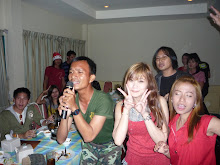We use these words (before, after, while and when) to introduce time clauses to tell when something happens.
Rudy washed the floor before he watched the soccer match.
Rudy washed the floor after the soccer match.
Rudy washed the floor when the soccer match ended.
Rudy washed the floor while he was watching the soccer match.
In all of these cases, Rudy washed the floor. However, we have to look at the time clauses to see when the floor was washed.
Time clauses:
before he watched the soccer match
after the soccer match
when the soccer match ended
while he was watching the soccer match
In all of these examples, the main (independent) clause is "Rudy washed the floor". The time clause simply states the relationship of other actions (watching the soccer match) to the activity in the main clause.
Let's analyze the time sequence--with another example.
The phone rang after we ate dinner. (First we ate our meal, and then the phone rang.)
The phone rang before we ate dinner. (First the phone rang, and then we ate.)
The phone rang when we started dinner. Also: The phone rang as we ate dinner. (We started to eat and the phone rang at the same time.)
The phone rang while we were eating dinner. Also: The phone rang as we were eating dinner. (This is the same as above, but with the progressive tense [-ing]).
The Grammar
Independent clause Dependent clause
= The phone rang = before we ate dinner.
The phone rang is an independent clause. It can stand alone grammatically.
before we ate dinner is a dependent clause. It needs an independent clause to be a complete sentence. It is a sentence fragment when it is used alone.
Punctuation
-The phone rang before we ate dinner.
-Before we ate dinner, the phone rang.
When the independent clause comes first in the sentence, no comma is needed.
When the dependent clause comes first in the sentence, the clauses are separated by a comma.
Different verb tenses
Look at these verb tenses:
*two past tense events
-It started to rain before I got home.
-Jaime had a drink before he played tennis.
*modal auxiliary and present tense
-I have to get home before it starts of rain.
-Jaime has to have a drink before he plays tennis.
*two past tense events
-Henry went to the movie after he had dinner
-Prof. Simon gave a test after the spring break ended.
*modal auxiliary and present tense
-Henry may go to the movie after he has dinner.
-Secretary Simon ought to negotiate with the rebels before the situation gets out of hand.
*an on-going event interrupted by a single event in the past
-Myra was reading a book when the phone rang.
*past tense cause and effect
-Myra had to get up when the phone rang.
*two past tense events
-Ben asked for a ride when Myra answered the phone.
*two future events
-Myra will leave to pick up Ben when she hangs up.
*two past tense continuous activities
-I was listening carefully while the manager was explaining the problem.
*one past tense continuous event interrupted by single action
-The doorbell rang while I was taking a shower.
Cause and Effect
You can use when or after to explain some cause and effect situations.
Effect: He got a flat tire (puncture).
Cause: He ran over some glass.
He got a flat tire after he ran over some glass.
After he ran over some glass, he got a flat tire.
Cause: It rained.
Effect: Our paint job was ruined.
When it rained, our paint job was ruined.
Our paint job was ruined when it rained.

ไม่มีความคิดเห็น:
แสดงความคิดเห็น